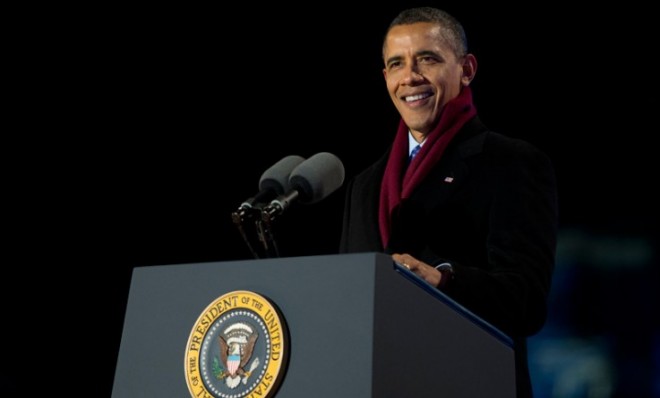The surprisingly solid jobs report — and how it strengthens Obama's hand in the fiscal cliff talks
A rise in the jobless rate might have hurt the president's argument that America ought to raise taxes on the wealthy


A free daily email with the biggest news stories of the day – and the best features from TheWeek.com
You are now subscribed
Your newsletter sign-up was successful
The Labor Department on Friday reported that the U.S. economy added 146,000 jobs in November, and that the unemployment rate fell to 7.7 percent, its lowest level since December 2008. The labor market's performance was far better than expected, with most analysts projecting a deeper economic fallout from Hurricane Sandy, which battered the East Coast in late October, bringing economic activity in some areas grinding to a halt for much of early November. That the economy could literally weather the storm with relative ease is just the latest evidence that the agonizingly long recovery from the Great Recession is here to stay.
Leading the gain in jobs were the health care sector, professional and business services, and retail industries. The strong performance in retail is particularly heartening, since it shows that consumers are opening their wallets, a boon for many companies.
However, the report was also full of reminders that the economy isn't as healthy as it could be. The construction industry shed 20,000 jobs, a sign that the housing market is still struggling. The manufacturing sector, an important bellwether, lost 12,000 jobs. And the economy as a whole added 49,000 fewer jobs in September and October than initially reported.
The Week
Escape your echo chamber. Get the facts behind the news, plus analysis from multiple perspectives.

Sign up for The Week's Free Newsletters
From our morning news briefing to a weekly Good News Newsletter, get the best of The Week delivered directly to your inbox.
From our morning news briefing to a weekly Good News Newsletter, get the best of The Week delivered directly to your inbox.
Still, the jobs picture is fairly bright. And that's welcome news for President Obama, who is in the midst of negotiations with Republicans on a budget deal to avert the fiscal cliff — a potentially recovery-strangling package of steep tax hikes and spending cuts set to take effect at year's end. Obama has demanded that taxes rise for households making more than $250,000 a year. As Chris Cillizza at The Washington Post notes, "A disappointing report — unemployment over 8 percent, slow or no job growth — would hand Republicans some (badly needed) leverage to make the argument that now is not the time to be raising taxes on anyone — up to and including those who make $250,000 or more a year." With a strengthening economy on his side, Obama is in a stronger position as the negotiations move forward.
A free daily email with the biggest news stories of the day – and the best features from TheWeek.com
Ryu Spaeth is deputy editor at TheWeek.com. Follow him on Twitter.
-
 How the FCC’s ‘equal time’ rule works
How the FCC’s ‘equal time’ rule worksIn the Spotlight The law is at the heart of the Colbert-CBS conflict
-
 What is the endgame in the DHS shutdown?
What is the endgame in the DHS shutdown?Today’s Big Question Democrats want to rein in ICE’s immigration crackdown
-
 ‘Poor time management isn’t just an inconvenience’
‘Poor time management isn’t just an inconvenience’Instant Opinion Opinion, comment and editorials of the day